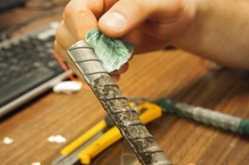Recommended practice for reporting experimental data produced from studies on corrosion of steel in cementitious systems
DOI:
https://doi.org/10.21809/rilemtechlett.2019.90Keywords:
reinforcement, steel, corrosion, concrete, testing, pore solution, rebar, chlorideAbstract
Experience has shown that many aspects of experimental design for studying steel corrosion in cementitious systems may significantly influence the obtained results. In the absence of standardized methods to study steel corrosion in concrete, researchers usually define their own test setups, which partially explains the large scatter and uncertainty in the aggregated published data. When the details of these setups are not provided adequately, experimental results cannot be interpreted in a wider context. Unfortunately, many scientific publications lack important experimental details. Therefore, this paper aims at improving the quality of reported experimental details, observations, and data in scientific publications, and raising awareness for relevant issues to improve the quality of research in the field. To this end, this paper provides a list of experimental details that have been found important by many decades of research, and which are, thus, recommended to be considered in conducting and reporting laboratory studies involving corrosion of steel embedded in cementitious systems. Finally, we propose a checklist for reporting experimental data in scientific publications.

Downloads
Published
How to Cite
Issue
Section
License
Authors retain copyright of the articles published in RILEM Technical Letters and grant the journal the right of first publication with open access. The work is simultaneously licensed under Creative Commons Attribution 4.0 International License (CC BY 4.0) that allows others to share and adapt the work under the following terms: 1) a proper attribution is given in a form of a reference to the original work's authorship and initial publication in RILEM Technical Letters (bibliographic record with the DOI link); 2) a link to the license is provided; 3) the changes (if any) are indicated.









